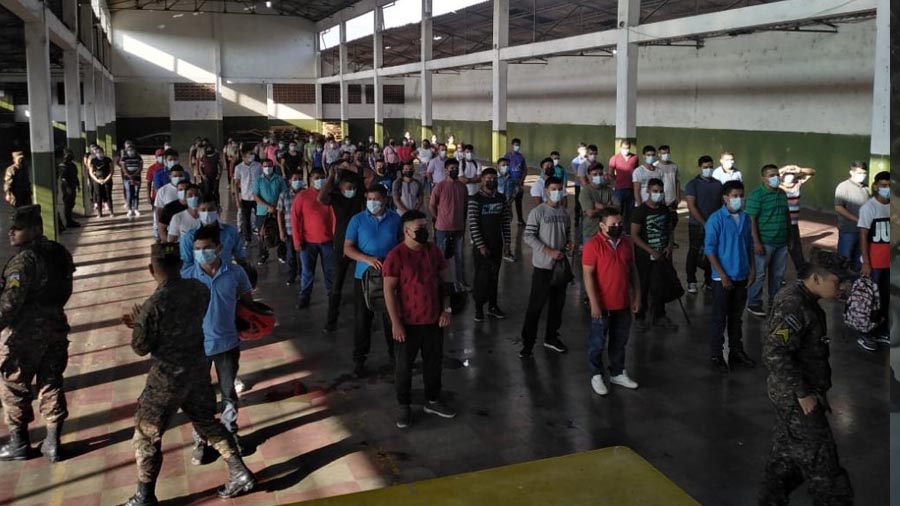
In the midst of journalistic investigations pointing to an agreement between the government and the gangs, President Bukele called on 20,000 young people to enlist in the Army and fight “internal and external enemies,” an allusion to the political violence of the ‘past.
This is not the first time President Nayib Bukele has used the term “internal and external enemies” to harangue Salvadorans. He has also done so by swearing in new soldiers, in his Independence Day speech and more recently, in his words to the Legislature for its second anniversary.
Related content: José Mariner: “A country in debt is creating an army of 20,000 new soldiers”
On no occasion did he go unnoticed, but yesterday he again referred to “internal and external” enemies when he called on young people to enlist in the Army, an announcement he had made a few weeks ago.
MANY DOUBTS ABOUT MILITARISM
Different sectors consulted do not understand why President Bukele speaks of internal and external enemies or his eagerness for the role of the Armed Forces in national life.
WHO DO YOU CONSIDER AN INTERNAL ENEMY?
IF WE ARE NOT AT WAR, WHO IS THE EXTERNAL ENEMY?
IF THE TERRITORIAL CONTROL PLAN WORKS, WHY DOES IT NOT STRENGTHEN THE NATIONAL CIVIL POLICE?
HOW MUCH WILL IT COST TO PREPARE, MAINTAIN AND GIVE A SALARY OF 20,000 NEW SOLDIERS?
WHY DON’T YOU INVEST THIS MONEY IN SCHOOLS OR HEALTH?
WHAT MESSAGE DOES IT SEND TO NEIGHBORING COUNTRIES WITH ITS INCREASE IN MILITARY STAFF?
WHAT PROTAGONISM WILL YOU GIVE TO THE NEW CONSTITUTION TO THE ARMED FORCE?
Yesterday, via a message on Twitter, Bukele launched the call for 20,000 young people to join the Armed Forces, at a time when El Far revealed an investigation in which he points out to the Government an agreement with the gangs to reduce the homicides.
“We are looking for 20,000 young people who want to defend our homeland from their internal and external enemies,” the president tweeted Tuesday night.
You can read: Has the Police stopped confronting the gangs?
Celia Medrano, a human rights lawyer, is clear: the terms in which President Bukele refers remind her of the times when government critics, opponents, were considered “internal enemies.”
“As on previous occasions, groups that control state structures do not specify what is meant by an internal enemy or an external enemy. The terms evoke an era in which any critic of power in turn could be described as an internal enemy. thereby justifying serious violations against these people or sectors, “Medrano reacted.
The political message sent by the president with these terms also worries Zaira Navas, from Cristosal.
For her, the president must clarify what kind of enemies he is referring to and sees very valid questions about what the ruler understands by internal and external enemies.
“This is a question we have to ask ourselves because everything points to the fact that in addition to distorting the role of the Armed Forces, the president is seeing internal enemies, which is very serious in our country because the problems of citizen security, violence are “They respond with completely different strategies, it is demonstrated nationally and internationally,” said Navas.
Read also: Carlos Ponce: “The gang now has a direct channel not only with a party, but with the Legislative Assembly”
For his part, the president of the DTJ Foundation, José Mariner, questioned the increase in the 20,000 soldiers and expressed doubts about who the internal enemy is.
“Let’s see: if gangs are clearly not their‘ internal enemies ’, to defend themselves from who needs 20,000 soldiers?” Mariner tweeted in clear reference to the lighthouse news that the government has an agreement with the colles.
For Cristosal’s chief security officer, this rhetoric of the president has no place in a context of peace and democracy.
“We are not at a time of war, it is worrying that the president is calling for the defense of internal and external enemies. We hope that the message that is being sent, including constitutional reform, is not aimed at changing the role of the Force Armed from the Constitution, because in practice we are seeing what is being done, “said Navas.

Nayib Bukele’s tweet where he calls on young recruits to defend the country from “internal enemies.”
Better to strengthen the PNC
In the sphere of citizen security, both Medrano and Navas agree that it is not right to strengthen the Armed Forces, which is not prepared for public security tasks but for war.
In addition, they recalled that the National Civil Police is an institution that has emerged from the Peace Accords to ensure security in a context of respect for human rights.
“If the Territorial Control Plan is working and there is a real decrease in homicides, the most successful strategy in this case would be to strengthen the police so that they gain public trust and really solve the problems of violence,” he recommended Navas.
Medrano even goes further and fears that organized crime will infiltrate the Armed Forces, which would be counterproductive.
It may interest you: Constitution of Ulloa opens door to legalize armed groups
“This lack of transparency and seriousness in the decision to increase in this way the number of military elements dangerously exposes the population to scenes of criminal groups dressed in military uniform in the streets, obedient to an autocratic and authoritarian style of government more concerned with maintaining popularity and attacking critics that in order to give real and sustainable answers to the needs of the population, “Medrano summed up.
Mariner, in statements to El Diari d’Avui, emphasized how the military has once again become part of a public policy.
“The military is in all areas of public management even other officials like those in Health, when they appear guiding people who are going to be vaccinated. This indicates that their military vision is replacing government management in other areas, the clearest is Health, ”he illustrated.